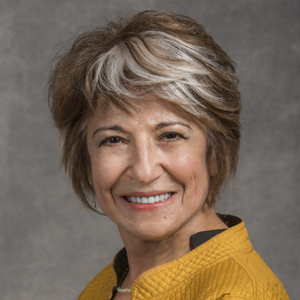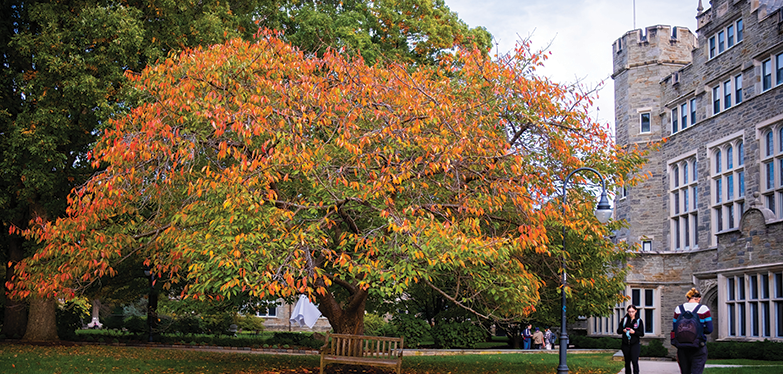Mina Bissell ’63
 Mina Bissell ’63 has had an astonishing career. “Google” her name and you find terms such as “revolutionized,” “paradigm-shifting,” “forged a new frontier,” and “fearless, uncompromising leadership.”
Mina Bissell ’63 has had an astonishing career. “Google” her name and you find terms such as “revolutionized,” “paradigm-shifting,” “forged a new frontier,” and “fearless, uncompromising leadership.”
Bissell has spent forty plus years in cancer research, currently as Distinguished Scientist in the Life Sciences Division at the Lawrence Berkeley National Laboratory (LBNL).
She is best known for her theory that large, insoluble molecules that surround the epithelial tissues referred to as extracellular matrix (ECM) signal to nucleus and are crucial regulators of gene expression in both normal and malignant cells. In other words, that context and microenvironment matter in cells, and that once you are conceived, ‘phenotype is dominant over genotype’!
Many scientists rejected this theory for a very long time, and Bissell endured much criticism. But this powerhouse of a woman stuck with it, and her theory is now a widely accepted foundation of cancer research.
That’s why Bissell is cited as the scientist who fundamentally changed the research of tumor biology. For this, she has received many awards and accolades, including the 2016 E.B. Wilson Medal from the American Society of Cell Biology, its highest scientific honor, for “turn[ing] cancer biology on its ear.” And in April of this year, she will receive the American Association of Cancer Research’s (AACR) Life Achievement Award.
Born and raised in Iran, it was clear from the start that Bissell was going places. She loved to read, had a photographic memory and held her own in debates with her father, a well-known attorney. At age eight, she suffered a serious, life-threatening head injury that resulted in the loss of much of her photographic memory and all of her hearing in her left ear. Despite this, she consistently tested as one of the top students at school and landed the number one spot in that country when she was 18 years old.
That same year, she received a scholarship to study in a STEM (science, technology, engineering and math) field in the United States or England. Her father felt she’d receive a better education in England because, he said, the “U.S. was too young to educate women.” But Bissell wanted to come to the U.S. and, with the help of her grandfather who agreed, won her father over.
To apply to American universities, she had to submit an application to the American Friends of the Middle East (AFME), a branch of the U.S. government. The head of AFME was so impressed with her application that he asked to meet with Bissell and her father to discuss her future.
“He suggested I should go to Bryn Mawr since, to his mind and later to my mind, Bryn Mawr was – and remains – one of the best colleges in the United States.” She was admitted and loved it.
“I was lucky to come to Bryn Mawr,” she says. “It was all about smart, successful women, and the faculty were amazing.” She struggled with her English, but credits one of her professors for her support, brilliance and inspiration. “I fell in love with English literature and had an amazing and brilliant mentor, Ann Berthoff. To this day, she is my favorite teacher and, at age 93, is one of my most beloved friends.”
Bissell spent an “enchanting” two years at Bryn Mawr before leaving to marry a graduate student at Harvard. She finished her undergraduate education at Radcliffe but maintains an immense loyalty to Bryn Mawr. “I still tell people that I think Bryn Mawr is the best school in the country. I owe my ability to write and to organize my essays to Ann and Bryn Mawr.”
She remains connected with the College, returning for at least one reunion and in 2011 to give the Bernard K. Rothenberg Lecture in Biology and Public Policy. In 2007, she regretfully declined to join the external review committee for the Bryn Mawr and Haverford Biology departments because she would be in San Diego to accept the Pezcoller Foundation-AACR International Award for Cancer Research.
Bissell has also established a deferred charitable gift annuity* for the College. When asked why she continues to support it financially, she said, “Bryn Mawr gave me a great gift – including my friend Ann Berthoff – and so it deserves my help.”
Bissell shows no sign of slowing down anytime soon. She continues to run the Bissell Lab at LBNL studying the tumor microenvironment and tissue architecture, is a member of the faculty in four graduate programs at U.C. Berkeley, claims a staggering list of current professional activities and organizations, and keeps a robust schedule of speaking engagements and publication work.
We like to think her time at Bryn Mawr helped to form the “fearless, uncompromising leadership” that is evident in her life’s work, and thank her for supporting the College. Anassa kata Dr. Bissell!
Some of the information for this article comes from the following sources with permission: Bissell Lab website; Context is Everything: Mina Bissell to Receive E.B. Wilson Medal; Thinking in three dimensions: discovering reciprocal signaling between the extracellular matrix and nucleus and the wisdom of microenvironment and tissue architecture, Mina J. Bissell, Mol. Biol. Cell. 2016 Nov 1; 27(21): 3205–3209.
*Learn more about how a gift annuity can support the College and provide income for the donor or her designee at giftplanning.brynmawr.edu.


